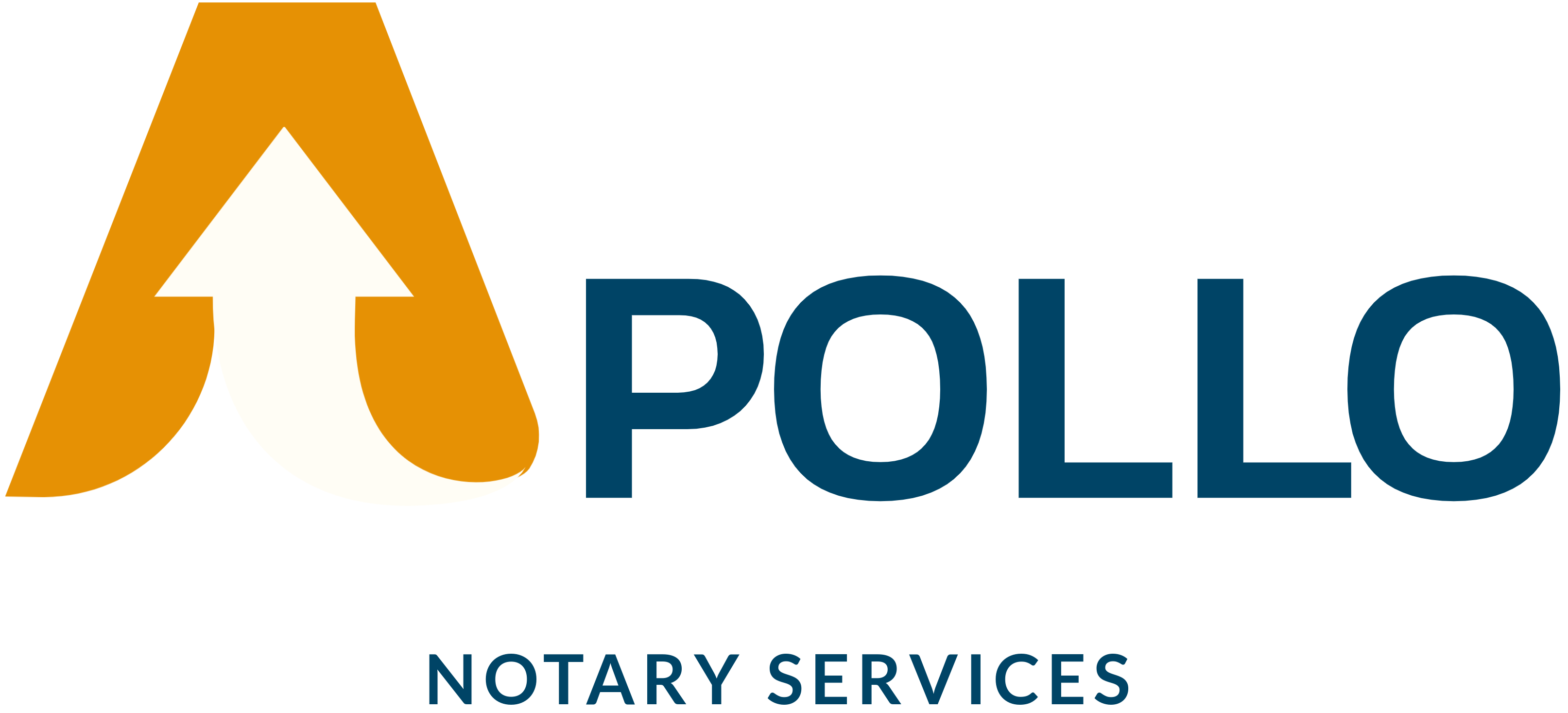Power of attorney documents are among the most important legal tools you can have, yet they’re also among the most misunderstood. Whether you’re planning ahead for potential incapacity or helping a loved one navigate their legal affairs, getting your power of attorney right is crucial. Unfortunately, many people make critical errors that can render these documents ineffective when they’re needed most.
At Apollo Notary Services, we’ve seen firsthand how small mistakes can create big problems. The good news? Most of these issues are completely preventable once you know what to watch for.
Mistake #1: Using Vague Language and Unclear Terms
One of the biggest problems we see is power of attorney documents filled with ambiguous language. When your document doesn’t clearly specify what your agent can and cannot do, it creates confusion for everyone involved: banks, healthcare providers, family members, and even your agent themselves.
 The Problem:
The Problem: Vague terms like “handle my affairs” or “make financial decisions” leave too much room for interpretation. Banks might refuse to honor the document, family members may challenge your agent’s authority, and your agent might hesitate to take necessary actions because they’re unsure of their limits.
How to Fix It: Be specific about the powers you’re granting. Instead of general language, include detailed provisions like “authorize real estate transactions,” “manage investment accounts,” “file tax returns,” and “access safe deposit boxes.” Work with a qualified legal professional to ensure your language is both comprehensive and precise.
Mistake #2: Choosing Your Agent Based on Emotion Rather Than Logic
Many people automatically choose their oldest child, closest sibling, or best friend without really considering whether that person is equipped for the role. While family loyalty and emotional bonds are important, they don’t guarantee someone will be an effective agent.
The Problem: An unsuitable agent can make poor financial decisions, fail to understand their responsibilities, or even abuse their authority. Even well-meaning agents can cause problems if they lack the necessary skills, time, or emotional stability to handle your affairs properly.
How to Fix It: Choose your agent based on practical qualifications. Look for someone who is:
- Financially responsible and organized
- Available and willing to take on the responsibility
- Good at communicating and making decisions under pressure
- Trustworthy and puts your interests first
- Preferably someone who lives nearby or can travel when needed
Consider appointing a backup agent in case your first choice becomes unavailable.
Mistake #3: Creating an Overly Restrictive Document
Some people worry so much about giving their agent too much power that they create documents that are too limited to be useful. This often happens when people focus only on their current needs without considering future possibilities.
 The Problem:
The Problem: If your power of attorney doesn’t include authority for real estate transactions, for example, your agent won’t be able to sell your home to pay for nursing care if you become incapacitated. Similarly, without digital property access, your agent might be locked out of important online accounts.
How to Fix It: Think beyond your immediate needs and consider what might be necessary in various scenarios. Your power of attorney should typically include authority over:
- Real estate transactions
- Banking and financial accounts
- Investment management
- Tax matters
- Insurance policies
- Digital accounts and property
- Business interests
- Personal property decisions
Mistake #4: Not Understanding the Different Types of Power of Attorney
Many people don’t realize there are different types of power of attorney documents, each serving specific purposes. Using the wrong type can leave gaps in coverage or create documents that don’t work when you need them most.
The Problem: A general power of attorney automatically expires if you become incapacitated: precisely when you’d need it most. Healthcare decisions require specific medical power of attorney documents. Some states have separate requirements for financial versus healthcare decisions.
How to Fix It: Understand your options:
- Durable Power of Attorney: Remains effective even if you become incapacitated
- General Power of Attorney: Expires upon incapacitation
- Limited Power of Attorney: Covers specific tasks or time periods
- Healthcare Power of Attorney: Specifically for medical decisions
- Financial Power of Attorney: Covers financial and legal matters
Most people need durable power of attorney documents for both financial and healthcare decisions.
Mistake #5: Failing to Include Proper Oversight and Safeguards
Granting broad authority without any checks and balances can be risky, even with trusted agents. Without proper safeguards, there’s no way to monitor your agent’s actions or prevent potential abuse.
 The Problem:
The Problem: Even honest agents can make mistakes, and unfortunately, some agents do abuse their authority. Without oversight mechanisms, financial abuse or poor decision-making might go undetected until significant damage is done.
How to Fix It: Build in protective measures such as:
- Regular reporting requirements (monthly or quarterly financial statements)
- Co-agents who must act together for major decisions
- Restrictions on gift-giving or self-dealing
- Requirements for professional advice on major transactions
- Third-party notification requirements for significant actions
- Clear guidelines about record-keeping and documentation
Mistake #6: Keeping Your Power of Attorney Secret
Creating a power of attorney document and then hiding it away defeats the purpose entirely. If your agent doesn’t know where to find it, or if relevant institutions aren’t aware of its existence, it can’t fulfill its intended function.
The Problem: When family members don’t know about your power of attorney, they might pursue costly guardianship proceedings. If banks aren’t familiar with your agent’s authority, they might freeze accounts or refuse to cooperate. Time-sensitive decisions can be delayed or missed entirely.
How to Fix It: Communicate proactively about your power of attorney:
- Tell your chosen agent where the original document is stored
- Provide copies to your attorney, financial advisor, and key family members
- Notify your bank, investment firms, and insurance companies
- Consider registering with institutions in advance to streamline future processes
- Keep a list of who has copies and update it regularly
Mistake #7: Setting It and Forgetting It
Many people treat their power of attorney as a one-time task, but life circumstances change constantly. Outdated documents can become ineffective or even counterproductive over time.
The Problem: Your original agent might move away, become incapacitated themselves, or no longer be the best choice. Laws change, your financial situation evolves, and your preferences might shift. An outdated power of attorney might not reflect your current wishes or legal requirements.
How to Fix It: Review and update your power of attorney regularly:
- Schedule annual reviews with your attorney
- Update immediately after major life events (marriage, divorce, death of agent, significant illness, major financial changes)
- Ensure your document complies with current state laws
- Consider whether your agent is still the best choice
- Update contact information and financial institution details
- Review and modify the scope of authority as needed

Getting Professional Help with Power of Attorney Documents
While understanding these common mistakes is important, creating an effective power of attorney often requires professional assistance. The legal requirements vary by state, and the stakes are too high to risk getting it wrong.
When to Seek Help:
- If you have complex financial situations or business interests
- When dealing with multi-state property or assets
- If family dynamics are complicated
- When you need guidance on agent selection
- For proper notarization and witnessing requirements
At Apollo Notary Services, we frequently help clients with power of attorney notarization and can ensure your documents meet all legal requirements. Proper notarization is essential for most power of attorney documents to be legally valid and accepted by financial institutions and healthcare providers. For additional guidance, see the
Consumer Financial Protection Bureau’s guides for managing someone else’s money and the
National Notary Association’s guidance on notarizing powers of attorney.
Remember, a well-crafted power of attorney is one of the most valuable gifts you can give your loved ones: and yourself. It provides peace of mind knowing that your affairs will be handled according to your wishes, even if you can’t speak for yourself. Take the time to do it right, avoid these common mistakes, and review your documents regularly to ensure they continue serving your needs effectively.
Don’t wait until it’s too late. If you haven’t created a power of attorney yet, or if yours might have any of these issues, now is the time to take action. Your future self: and your family: will thank you for the foresight and careful planning.
 The Problem: Vague terms like “handle my affairs” or “make financial decisions” leave too much room for interpretation. Banks might refuse to honor the document, family members may challenge your agent’s authority, and your agent might hesitate to take necessary actions because they’re unsure of their limits.
How to Fix It: Be specific about the powers you’re granting. Instead of general language, include detailed provisions like “authorize real estate transactions,” “manage investment accounts,” “file tax returns,” and “access safe deposit boxes.” Work with a qualified legal professional to ensure your language is both comprehensive and precise.
The Problem: Vague terms like “handle my affairs” or “make financial decisions” leave too much room for interpretation. Banks might refuse to honor the document, family members may challenge your agent’s authority, and your agent might hesitate to take necessary actions because they’re unsure of their limits.
How to Fix It: Be specific about the powers you’re granting. Instead of general language, include detailed provisions like “authorize real estate transactions,” “manage investment accounts,” “file tax returns,” and “access safe deposit boxes.” Work with a qualified legal professional to ensure your language is both comprehensive and precise.
 The Problem: If your power of attorney doesn’t include authority for real estate transactions, for example, your agent won’t be able to sell your home to pay for nursing care if you become incapacitated. Similarly, without digital property access, your agent might be locked out of important online accounts.
How to Fix It: Think beyond your immediate needs and consider what might be necessary in various scenarios. Your power of attorney should typically include authority over:
The Problem: If your power of attorney doesn’t include authority for real estate transactions, for example, your agent won’t be able to sell your home to pay for nursing care if you become incapacitated. Similarly, without digital property access, your agent might be locked out of important online accounts.
How to Fix It: Think beyond your immediate needs and consider what might be necessary in various scenarios. Your power of attorney should typically include authority over:
 The Problem: Even honest agents can make mistakes, and unfortunately, some agents do abuse their authority. Without oversight mechanisms, financial abuse or poor decision-making might go undetected until significant damage is done.
How to Fix It: Build in protective measures such as:
The Problem: Even honest agents can make mistakes, and unfortunately, some agents do abuse their authority. Without oversight mechanisms, financial abuse or poor decision-making might go undetected until significant damage is done.
How to Fix It: Build in protective measures such as:


